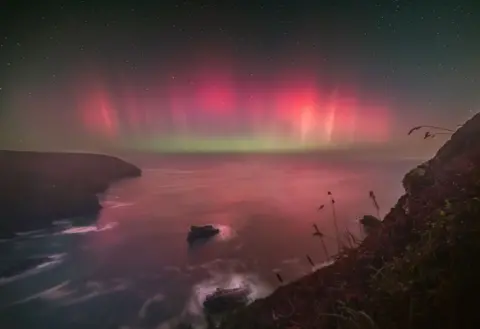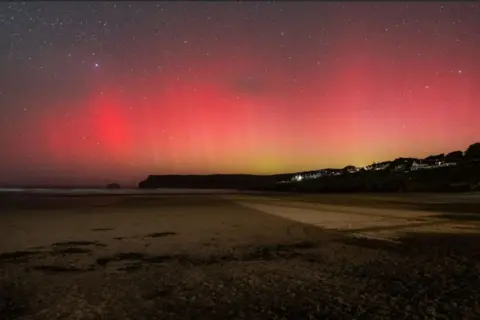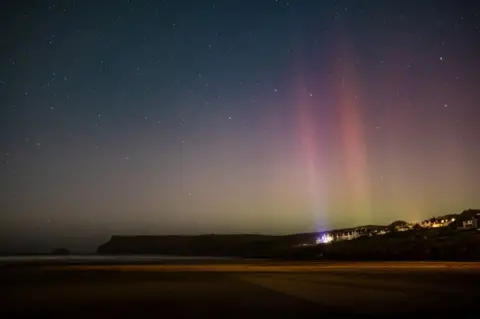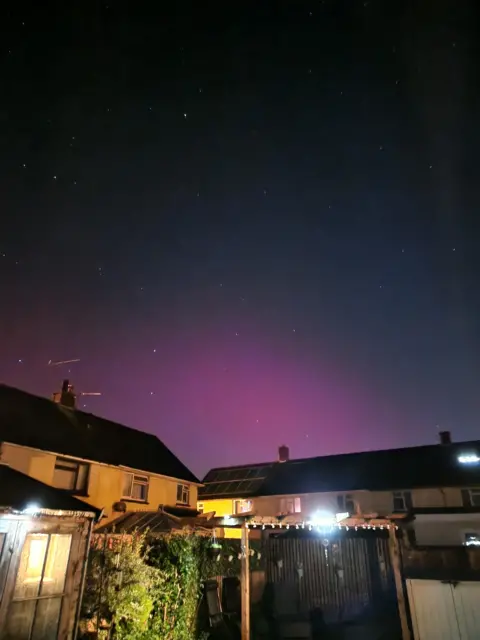Northern Lights caught on camera across South West
 Ross Jennings
Ross Jennings- People reported being "blown away" by the bright colours in the sky in the early hours of Monday
- Pictures were shared on social media of the lights in several parts of Devon and Cornwall
- BBC South West Meteorologist David Braine said it was a "very rare occurrence" in Cornwall
Sky watchers across parts of Devon and Cornwall were treated to a display of the Northern Lights on Sunday.
One photographer visiting Polzeath, Cornwall, who has been "chasing" the aurora for nine years said she was "blown away" by the sight.
Other people shared images on social media which they took in Godrevy, Penzance and Cullompton in Devon.
The natural light phenomenon occurs when particles from a solar flare interact with the Earth's magnetic field, which meteorologists say is very rare in Cornwall.
 Rebecca Douglas Photography / Latitude 50 & The Massey Partnership
Rebecca Douglas Photography / Latitude 50 & The Massey Partnership Rebecca Douglas, 39, captured the bright colours just before midnight on Sunday and then again in the early hours of Monday.
She said she had been visiting Cornwall from Ramsgate for photography shoots in the sea when an app alerted her to the aurora.
"You could see the red really clearly glowing and then the ribbons later on," she said.
"It was really vivid for about half an hour. It's such an elating feeling... it blows my mind every time."
She added: "It's the fact that you’re looking at the layers of our atmosphere – you can get a sense of how thick our atmosphere is."
 Rebecca Douglas Photography / Latitude 50 & The Massey Partnership
Rebecca Douglas Photography / Latitude 50 & The Massey Partnership Nikki Hall, 55, said: "We went out in the garden and I took one photo that came out so well, I then took a load more.
"It was amazing and so 'reddy' and 'purpley', whereas last time I saw it it was more green."
 Nikki Hall
Nikki HallBBC South West Meteorologist David Braine said: "Solar activity goes through an 11 to 14-year intensity cycle.
"We are coming to a peak in the cycle when the solar storms have the greatest strength.
"Last night we had a peak at 500 nanotesla (magnetic field strength).
"This is quite high, making it possible to see the Northern Lights over most, if not all, of the UK - cloud cover permitting".
He added: "For Cornwall to see it is very rare indeed and for those that managed it they were very lucky."
Dr Maria Walach, Research Fellow in space and planetary physics at Lancaster University and part of the Aurora Watch team, said: “Last night we saw a fairly large geomagnetic storm happening.
"The magnetometers picked up some particularly large variations which tend to be accompanied with strong auroral activity."
She added: "Forecasters and solar observers are predicting that we are likely to see more of this kind of erratic behaviour over the next year or so, which will hopefully mean that we will see more of these brilliant light displays.”
Follow BBC News South West on Twitter, Facebook and Instagram. Send your story ideas to [email protected].
